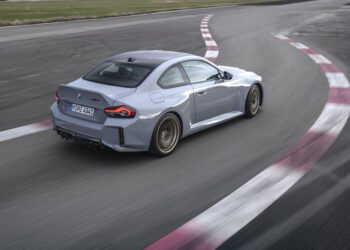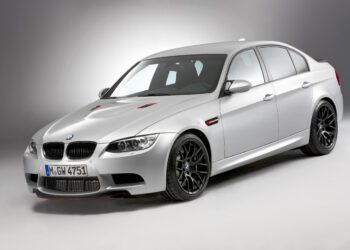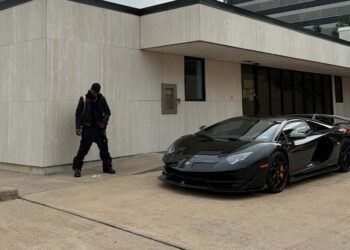Ultra-limited sports cars like the 1,000-unit BMW M4 CSL show us two things. First, they showcase just how far a manufacturer can push its current sports car platform, which in the case of the CSL, results in a stripped-out, carbon-fiber-infused, aggressive track day special. And second, they simultaneously hint at which high-power components might eventually trickle down to more mass-produced products. Case and point, the 2024 BMW M3 CS.
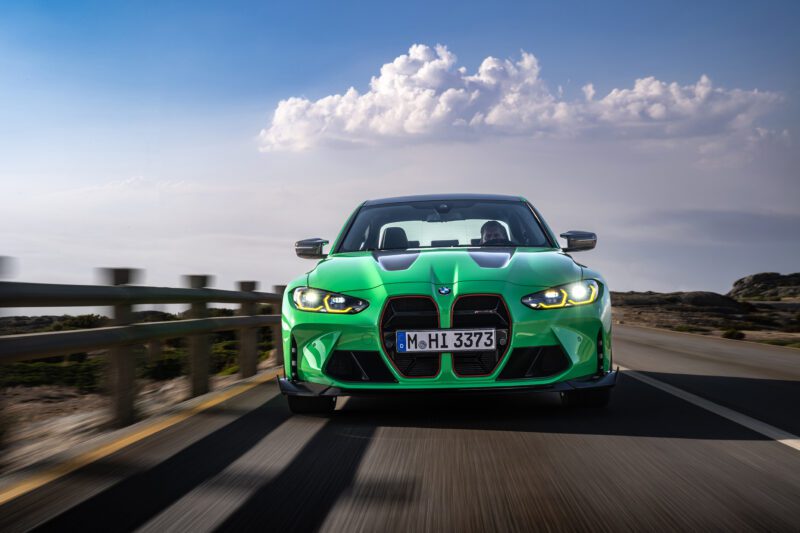
The “CS,” in M3 CS, which stands for “Competition Sport,” lacks the last letter denoting “Lightweight” of the CSL, but its formula is strikingly familiar. It employs extensive carbon fiber-reinforced plastic components such as its hood, roof, front splitter, air intakes, rear diffuser, rear spoiler, and mirror caps to save weight. The trend continues inside its cabin with its center console, shift paddles, and trim made of the same light material. The CS features M Carbon bucket seats as standard and a titanium rear silencer to complete its diet.
If these sound familiar, it’s because the M4 CSL offered many of the same standard equipment. A notable difference, however, is the M3 CS’s use of electronically adjustable carbon-fiber seats instead of the M4 CSL’s manually adjustable chairs. Tally up these weight savings, and the CS is around 75 lb lighter than an M xDrive-equipped M3 Competition.
Aside from just shedding pounds, the M3 CS sees extensive retuning to its dynamic stability control system and M Dynamic modes, with BMW citing that these are now better suited for track use. The same goes for its adaptive suspension, variable-ratio steering, and braking system, which now prioritize on-track performance. On the hardware side, the CS gets more track-focused camber settings, dampers, and anti-roll bars, which BMW claims are all in service of making the latest M3 a better track car.
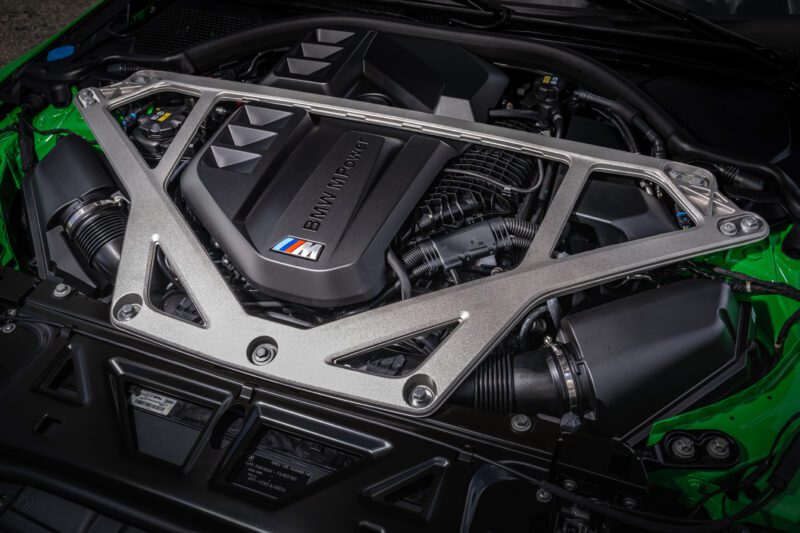
Another way the BMW M3 CS borrows heavily from the M4 CSL is with its updated powertrain. It features a sleeveless, closed-deck crankcase with a lightweight forged crankshaft allowing it to not only rev higher but withstand higher compression like the S58 in the “standard” M3. However, the CS gets an updated cooling system capable of extensive track work and increased boost pressure. Up from 24.7 psi to 30.5 psi, the CS develops 543 hp from 6,250 to 7,200 rpm and 479 lb-ft of torque from 2,750 to 5,950 rpm. This represents a 40-hp increase while the torque output remains unchanged.
With its standard M xDrive all-wheel-drive system and eight-speed ZF automatic transmission, the CS’s boosted engine blasts it to 60 mph in 3.2 seconds before topping out at its electronically limited 188 mph top speed. Although a 0.2-second quicker run to 60 mph over an M3 Competition xDrive will likely be tough to feel in the real world if the CS is any bit as ferocious as the rear-drive-only M4 CSL I drove last year, it’ll reveal most of its improvements on a twisty road.
To put all that power down, the CS also counts on standard Michelin Pilot Sport Cup 2 tires which measure 275/35Z/R19 at the front and 285/30ZR20 at the rear, which come mounted on a CS-specific set of V-spoke wheels. They’re a forged set measuring 19-in in the front and 20-in in the back. As standard, the CS offers M Compound brakes, although M Carbon-Ceramics remain an available option.
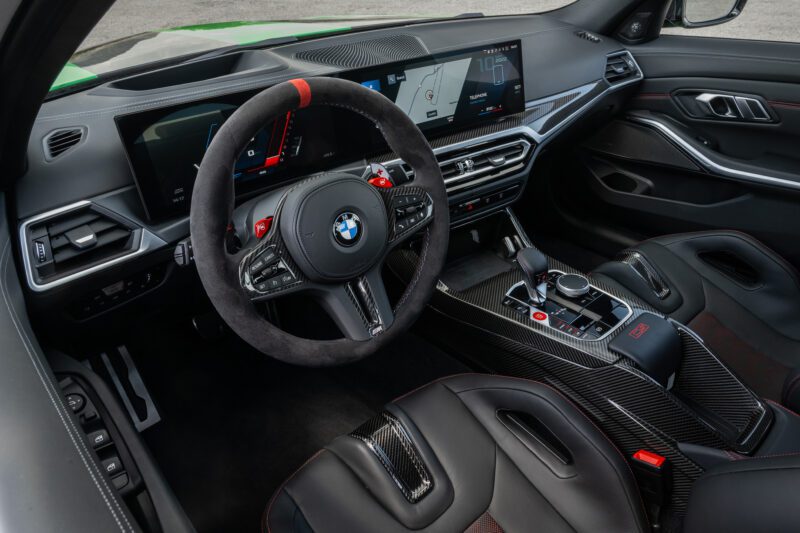
Since the M3 CS benefits from the latest updates to the G80 platform, you get a curved 12.3-in digital gauge cluster and a 14.9-in infotainment screen housed together, the latest eight-generation BMW iDrive system, Harman Kardon surround sound system, and a host of standard safety tech.
The CS then falls between a “standard” xDrive Competition model and the hardcore CSL. With more creature comforts, all-wheel drive, and two extra doors, the CS is as close to a daily drivable track-day car as BMW currently makes. However, if history is anything to go by, an M4 CS may follow shortly.
While I did mention in the intro that the M3 CS gets M4 CSL goodies in a more mass-produced package, don’t expect to see them in huge numbers. BMW plans to begin producing the M3 CS in its Munich plant sometime in March of this year. However, the German carmaker hasn’t said exactly how many units it plans to produce, just that it’ll be in “limited numbers.”
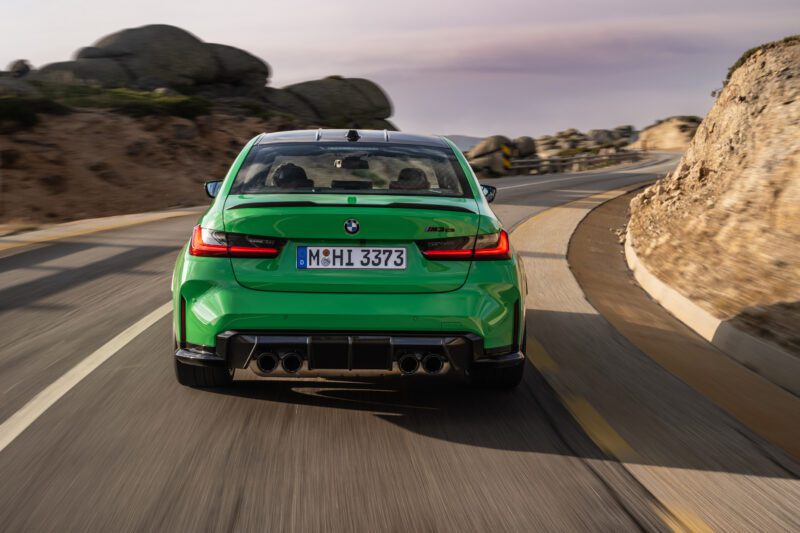
While we don’t know precisely how many of these M3’s BMW will make, it’ll likely be more than the 1,000-unit CSL. With a starting price of $119,695, including a $995 destination charge, it’s $36,100 more than the M3 Competition xDrive’s $83,595 base price. However, it includes a plethora of standard equipment, unique tuning, and lightweight components.
My main takeaway after driving the 1,000-unit M4 CSL last year was that it made a fantastic sports car that almost no one would ever experience. If the M3 CS channels at least a slice of that persona, more folks will experience the best that BMW’s M division can currently produce. View all current BMW M3 examples for sale on duPont REGISTRY by clicking on the link below.
Source: BMW







